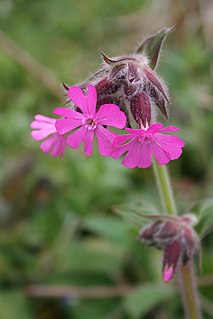
Silene is a genus of flowering plants in the family Caryophyllaceae. Containing nearly 900 species, it is the largest genus in the family. Common names include campion and catchfly. Many Silene species are widely distributed, particularly in the northern hemisphere.
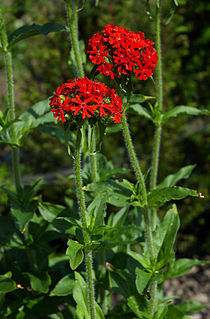
Silene chalcedonica, the Maltese-cross, flower of Bristol, Jerusalem cross, or nonesuch, is a species of flowering plant in the family Caryophyllaceae, native to central and eastern Russia, Kazakhstan, Mongolia and northwestern China.

Parkinsonia, also Cercidium, is a genus of flowering plants in the pea family, Fabaceae. It contains about 12 species that are native to semi-desert regions of Africa and the Americas. The name of the genus honors English apothecary and botanist John Parkinson (1567–1650).
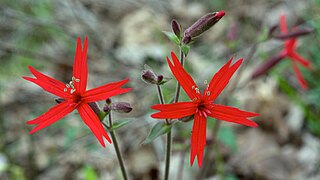
Silene virginica, the fire pink, is a wildflower in the pink family, Caryophyllaceae. It is known for its distinct brilliant red flowers. Each flower is approximately five centimeters in diameter and composed of five notched, brilliant red petals which extend into a long tube. It is a small, short-lived perennial, with lance shaped leaves. Its stems, and the bases of the flowers, are covered in short sticky hairs. Fire pink begins blooming in late spring and continuing throughout the summer. It is sometimes grown in wildflower, shade, and rock gardens.

Silene flos-cuculi, commonly called ragged-robin, is a perennial herbaceous plant in the family Caryophyllaceae. This species is native to Europe and Asia, where it is found along roads and in wet meadows and pastures. In Britain it has declined in numbers because of modern farming techniques and draining of wet-lands and is no longer common. However, it has become naturalized in parts of the northern United States and eastern Canada.

Silene dioica, known as red campion and red catchfly, is a herbaceous flowering plant in the family Caryophyllaceae, native throughout central, western and northern Europe, and locally in southern Europe. It has been introduced in Iceland, Canada, the US, and Argentina.

Silene nutans is a flowering plant in the genus Silene, most commonly known as Nottingham catchfly.

Silene vulgaris, the bladder campion or maidenstears, is a plant species of the genus Silene of the family Caryophyllaceae. It is native to Europe, where in some parts it is eaten, but is also widespread in North America, where it is a common wildflower in meadows, open woods, and fields.

Silene campanulata is a species of flowering plant in the family Caryophyllaceae known by the common names Red Mountain catchfly and bell catchfly. It may be a synonym of Silene greenei.
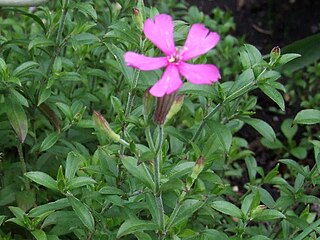
Silene schafta, the Caucasian campion or autumn catchfly, is a species of flowering plant in the family Caryophyllaceae, native to western Asia. Growing to 25 cm (10 in) tall by 30 cm (12 in) wide, it is a mat-forming semi-evergreen perennial, with narrow leaves and clusters of bright pink, five-petalled flowers in late summer.

Silene otites, called Spanish catchfly, is a species of flowering plant in the genus Silene, native to Europe and the Transcaucasus area, and introduced to Xinjiang in China. It varies its floral odors to attract mosquitoes and moths at night and flies and bees by day. It is dioecious, with separate male and female plants.
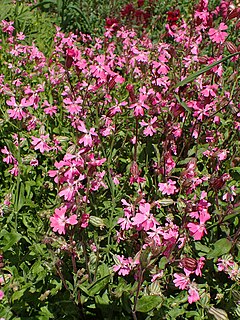
Silene pendula, called the nodding catchfly or drooping catchfly, is a species of flowering plant in the genus Silene, native to Italy, Greece, and Turkey, and introduced to scattered locations in North America, South America, Africa, Europe and Asia. A number of cultivars are available. A 2020 study showed with certainty that, despite their morphological similarities, Silene cisplatensis is not synonymous with Silene pendula.
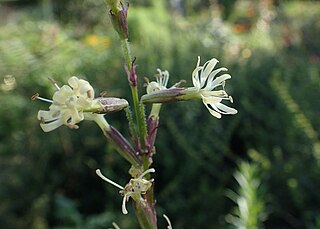
Silene tatarica, called the Tartarian catchfly, is a species of flowering plant in the genus Silene, found in north-central Europe and western Asia, from Germany and Norway eastwards to western Siberia and Kazakhstan. A specialist of riparian habitats, its seeds are dispersed by water.

Silene indica, the Indian campion, is a species of flowering plant in the family Caryophyllaceae, native to northern Pakistan, the Himalayas, and southern Tibet. It typically grows at elevations of 2,300 to 3,900 m.

Silene sieboldii is a species of flowering plant in the family Caryophyllaceae. The species goes by the common name Chinese lychnis or jian chun luo.

Silene rubella is a species of flowering plant in the family Caryophyllaceae. In Italy the species goes by the common name silene rosseggiante.
Silene disticha is a species of flowering plant in the family Caryophyllaceae.
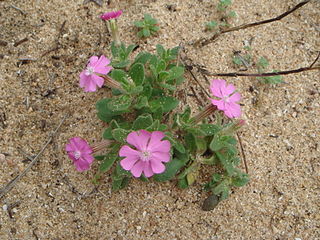
Silene littorea is a species of flowering plant in the family Caryophyllaceae. The species is an annual plant.

Silene zawadzkii is a species of flowering plant in the family Caryophyllaceae.

Silene tamaranae is a species of plant in the Caryophyllaceae family.


















